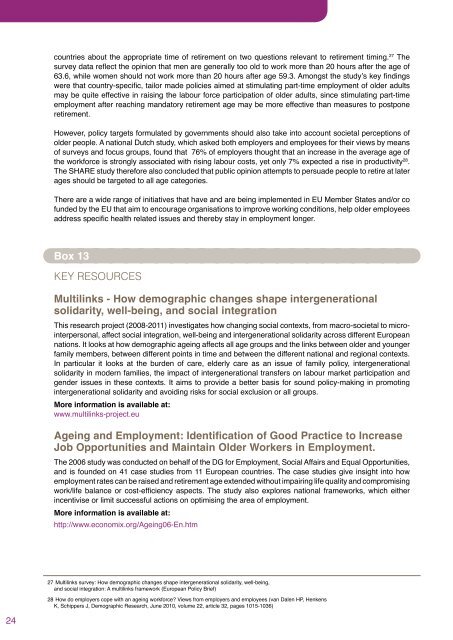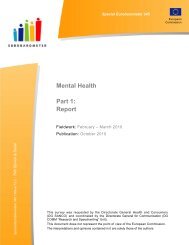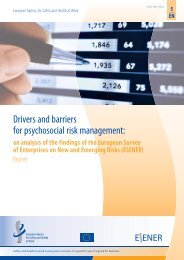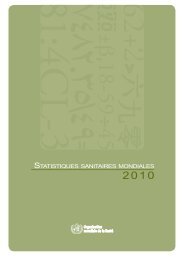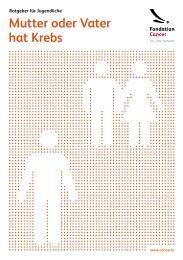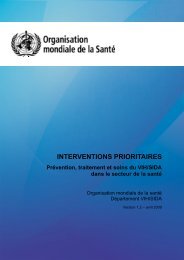healthy and active ageing - EuroHealthNet's Healthy Ageing Website
healthy and active ageing - EuroHealthNet's Healthy Ageing Website
healthy and active ageing - EuroHealthNet's Healthy Ageing Website
You also want an ePaper? Increase the reach of your titles
YUMPU automatically turns print PDFs into web optimized ePapers that Google loves.
countries about the appropriate time of retirement on two questions relevant to retirement timing. 27 The<br />
survey data reflect the opinion that men are generally too old to work more than 20 hours after the age of<br />
63.6, while women should not work more than 20 hours after age 59.3. Amongst the study’s key findings<br />
were that country-specific, tailor made policies aimed at stimulating part-time employment of older adults<br />
may be quite effective in raising the labour force participation of older adults, since stimulating part-time<br />
employment after reaching m<strong>and</strong>atory retirement age may be more effective than measures to postpone<br />
retirement.<br />
However, policy targets formulated by governments should also take into account societal perceptions of<br />
older people. A national Dutch study, which asked both employers <strong>and</strong> employees for their views by means<br />
of surveys <strong>and</strong> focus groups, found that 76% of employers thought that an increase in the average age of<br />
the workforce is strongly associated with rising labour costs, yet only 7% expected a rise in productivity 28 .<br />
The SHARE study therefore also concluded that public opinion attempts to persuade people to retire at later<br />
ages should be targeted to all age categories.<br />
There are a wide range of initiatives that have <strong>and</strong> are being implemented in EU Member States <strong>and</strong>/or co<br />
funded by the EU that aim to encourage organisations to improve working conditions, help older employees<br />
address specific health related issues <strong>and</strong> thereby stay in employment longer.<br />
Box 13<br />
Key resources<br />
Multilinks - How demographic changes shape intergenerational<br />
solidarity, well-being, <strong>and</strong> social integration<br />
This research project (2008-2011) investigates how changing social contexts, from macro-societal to microinterpersonal,<br />
affect social integration, well-being <strong>and</strong> intergenerational solidarity across different European<br />
nations. It looks at how demographic <strong>ageing</strong> affects all age groups <strong>and</strong> the links between older <strong>and</strong> younger<br />
family members, between different points in time <strong>and</strong> between the different national <strong>and</strong> regional contexts.<br />
In particular it looks at the burden of care, elderly care as an issue of family policy, intergenerational<br />
solidarity in modern families, the impact of intergenerational transfers on labour market participation <strong>and</strong><br />
gender issues in these contexts. It aims to provide a better basis for sound policy-making in promoting<br />
intergenerational solidarity <strong>and</strong> avoiding risks for social exclusion or all groups.<br />
More information is available at:<br />
www.multilinks-project.eu<br />
<strong>Ageing</strong> <strong>and</strong> Employment: Identification of Good Practice to Increase<br />
Job Opportunities <strong>and</strong> Maintain Older Workers in Employment.<br />
The 2006 study was conducted on behalf of the DG for Employment, Social Affairs <strong>and</strong> Equal Opportunities,<br />
<strong>and</strong> is founded on 41 case studies from 11 European countries. The case studies give insight into how<br />
employment rates can be raised <strong>and</strong> retirement age extended without impairing life quality <strong>and</strong> compromising<br />
work/life balance or cost-efficiency aspects. The study also explores national frameworks, which either<br />
incentivise or limit successful actions on optimising the area of employment.<br />
More information is available at:<br />
http://www.economix.org/<strong>Ageing</strong>06-En.htm<br />
27 Multilinks survey: How demographic changes shape intergenerational solidarity, well-being,<br />
<strong>and</strong> social integration: A multilinks framework (European Policy Brief)<br />
28 How do employers cope with an <strong>ageing</strong> workforce? Views from employers <strong>and</strong> employees (van Dalen HP, Henkens<br />
K, Schippers J, Demographic Research, June 2010, volume 22, article 32, pages 1015-1036)<br />
24


